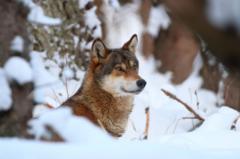In Romania's Carpathian mountains, shepherd József Rácz faces the harsh reality of protecting his flock from wolves and bears. As winter sets in, he reflects on the challenges of maintaining his 500 ewes while dealing with predators. Rácz loses five or six sheep annually to attacks, prompting him to rely on his 17 dogs, which he considers essential for safeguarding his herd.
This week marks a critical turning point for European wolves, as the Commission proposes moving them from Annex II (strictly protected) to Annex III (protected) of the Bern Convention. This shift would eliminate many protections that have allowed wolf populations to rebound across Europe, with estimates indicating their numbers have surged from 11,000 in 2012 to over 20,000 today. The proposal could enable individual EU countries to set annual quotas for wolf culling, raising concerns among wildlife conservationists.
Critics argue that instead of culling, improved protection methods, such as trained livestock guardian dogs, should be prioritized. They emphasize the ecological role of wolves, which help control populations of deer and wild boar, species that can damage crops and spread disease. Biologist Michal Haring highlights the benefits of wolves in managing diseases like African swine fever, stating that they contribute to the overall health of the ecosystem.
Opponents of the culling plan reference a 2023 EU report which notes that only 50,000 of Europe’s 68 million sheep and goats are killed by wolves annually, a minuscule fraction of the total. Additionally, there have been no recorded fatal wolf attacks on humans in 40 years, suggesting that wolves pose minimal risk to people.
In Luxembourg, where wolves have yet to be spotted, government official Laurent Schley advocates for tolerance towards wolves, aligning European expectations with wildlife conservation efforts globally. However, opinions vary among local farmers like Rácz, who argue for stronger measures against predators due to the significant threat they pose to livestock. Rácz recalls the tragic loss of his beloved dog, Moody, to wolves, a stark reminder of the risks faced by livestock owners.
As discussions continue, the future of wolves in Europe hangs in the balance amid competing interests of wildlife preservation and agricultural safety.
This week marks a critical turning point for European wolves, as the Commission proposes moving them from Annex II (strictly protected) to Annex III (protected) of the Bern Convention. This shift would eliminate many protections that have allowed wolf populations to rebound across Europe, with estimates indicating their numbers have surged from 11,000 in 2012 to over 20,000 today. The proposal could enable individual EU countries to set annual quotas for wolf culling, raising concerns among wildlife conservationists.
Critics argue that instead of culling, improved protection methods, such as trained livestock guardian dogs, should be prioritized. They emphasize the ecological role of wolves, which help control populations of deer and wild boar, species that can damage crops and spread disease. Biologist Michal Haring highlights the benefits of wolves in managing diseases like African swine fever, stating that they contribute to the overall health of the ecosystem.
Opponents of the culling plan reference a 2023 EU report which notes that only 50,000 of Europe’s 68 million sheep and goats are killed by wolves annually, a minuscule fraction of the total. Additionally, there have been no recorded fatal wolf attacks on humans in 40 years, suggesting that wolves pose minimal risk to people.
In Luxembourg, where wolves have yet to be spotted, government official Laurent Schley advocates for tolerance towards wolves, aligning European expectations with wildlife conservation efforts globally. However, opinions vary among local farmers like Rácz, who argue for stronger measures against predators due to the significant threat they pose to livestock. Rácz recalls the tragic loss of his beloved dog, Moody, to wolves, a stark reminder of the risks faced by livestock owners.
As discussions continue, the future of wolves in Europe hangs in the balance amid competing interests of wildlife preservation and agricultural safety.





















